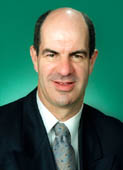Can you remember what were you doing when you were 11 years old? Maybe you were getting into harmless mischief with other kids at the local shopping centre. Maybe you were involved with local sporting clubs, school plays or avoiding homework because your favourite cartoon was on. Labor MP Kelvin Thomson may well have been doing all of these things too but he was also pursuing a love a nature – an interest that eventually led to a life in politics.
At age 11 the future Labor MP, along with his younger brother Lex, started a wildlife society called the Pascoe Vale Young Naturalists and decades later he is still

heavily involved in conservation and environmental issues.
Books such as Rachel Spring’s Silent Spring and Vincent Serventy’s A Continent in Danger were influential for the young Thomson as were the battles fought by the conservation movement in Victoria in the mid 1960s. Thomson eventually joined the Labor party in early 1975 at age 19 as he felt they were a better bet in relation to environmental issues.
After 37 years in politics, Kelvin Thomson continues to raise awareness of the detrimental effects an increasing population is having on Australia. Food resources, traffic congestion, housing affordability and increased cost of living are just a few of the problems Australians are facing says Thomson. Not to mention the continued demolition of natural habitats in order to cater for more people.
The population issue is one of Thomson’s key interests. A 14-point plan was submitted to parliament in November in 2009 to highlight problem areas and find possible solutions to maintain Australia’s economy, and more importantly, help it become more self-sufficient.
The federal election in 2010 loomed as a hurdle in this issue. If Thomson was not re-elected to his seat in the Wills electorate, the issue could slip into the background. Lucky for Thomson Wills is a Labor stronghold and he retained the seat with a 22.64 per cent two-party preferred win.
After posing the population question to parliament in 2009, Thomson garnered mixed responses with some believing it was a valid function of Australia’s net overseas migration rate. Skilled migration intake had been recorded at 24,000 people per annum in 1996, but this figure sky-rocketed to 114,777 people per annum between 2008 and 2009.
It wasn’t even a political issue. Employers were crying out for skilled workers during the mid ‘90s and the Howard government responded by increasing skilled migration. Thomson insists this was, and is, a short-sighted policy and other avenues should be sought to improve the working industry in Australia.
‘I think we should invest in universities and invest in our own students. We must ensure they have the skills, qualifications and the training to meet our workforce needs,’ he said.
When asked about Howard’s skilled migration policy Thomson said: ‘I think it reflects a failure on our part to train young Australians and to develop their skills. We should put priority into this rather than seeking to bring those skills from outside Australia.’
Thomson isn’t finding it overly difficult to get the public in his corner – over two-thirds of his constituents are in favour of a population cap.
The biggest hurdle this issue seems to be facing is from Thomson’s colleagues in parliament. Julia Gillard was against a ‘big’ Australia when she initially took over as Prime Minister, but Thomson has noticed very little change, as migration levels remain high.
‘Within the political system it is extremely difficult to persuade people to move in this direction because there is a strong push from big business in general. Property developers in particular are in favour of high migration and high population outcomes,’ says Thomson.
Another issue is the perception of racism in adopting a population cap that would deny people from other countries entering Australia. As an advocate on reducing migration intake, Kelvin Thomson categorically denies this belief.
‘I think that’s a really weak and absurd argument. I don’t have any interest in the country from which people come,’ he said.
‘I am in favour of us increasing the number of refugees we take. I’m in favour of us being a compassionate and decent international citizen. I’m also in favour of us increasing our foreign aid program.’
In fact, Thomson had incorporated the increase of refugee intake into his speech in 2009 in relation to the 14-point plan. It’s the skilled migration program that Thomson thinks needs revaluation.
‘Skilled migration is not about being a compassionate and decent international citizen. It is about us taking the best and brightest from other countries, and frankly when they’re poor countries, that’s not doing those countries any favours at all,’ says Thomson.
Reducing migration intake levels may be seen as a self-centred policy, but Kelvin Thomson, with his 14-point plan for population capping, aims to dispel these views, and perhaps improve Australia’s economic and environmental prospects in the process.
John Flint is a student at La Trobe University.
To view profiles of some of the other backbenchers as part of upstart’s Backbench Insiders project, click here.






